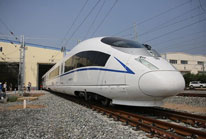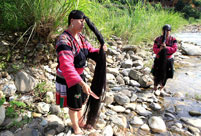

RIO DE JANEIRO, Aug. 16 (Xinhua) -- Even before the last bounce ended off the table of the Olympic women's table tennis team final on Tuesday, Kong Linghui, head coach of China, the eventual winner, has sent his thoughts to the Tokyo Games four years later.
"Me and Li Xiaoxia, we were watching the third and doubles game on the side court, and talked about what the situations will be in four years," Kong said. "It'll definitely not be this easy."
"I mean, Germanyis a great team, but Japancould be much tougher an opponent when Tokyo stages the Olympic Games," he added.
With a brief 3-0 win over the German paddlers on Tuesday evening, the all-time leading Chinese secured a third out of four gold medals on offer at table tennis in Rio Olympics, the 27th overall for Team China since the sport's introduction to Seoul 1988.
Their opponents, unexpected finalists who outlasted the 2012 London Olympic runner-up Japan in full five games in Monday's semis, chopped just one off 10 sets in total, but should be satisfied for a silver, a first ever Olympic medal in history for Germany's women paddlers.
With two Grand Slam winners Li Xiaoxia and Ding Ning plus the current world No. 1 Liu Shiwen in the team, China's head coach Kong, a Grand Slam winner himself 16 years ago, faced no dilemma in lining up his squad.
However, he's pondering how table tennis world to develop leading to the 2020 Tokyo Games.
"In four years, Ding Ning will turn 30 years old and Liu Shiwen 29. Li Xiaoxia, now 28, could be as competitive at that time as she does right now, but no one can guarantee that. We' ll have to play the next Olympics with new blood.
"Yes, we are never gonna fear that since China always prepare for the next generation of table tennis. But it will make the task of defending all four titles even tougher," he said.
Almost four years ago when Kong took the helm of the Chinese women's team, his key players in these Olympic Games' outing squad Li Xiaoxia and Ding Ning had already tested their own qualities on the court of London 2012 under the charge of former coach Shi Zhihao.
"We achieved here another gold sweep in style, conceding only three sets all together through singles and team events. It's a result coming from the efforts of all coaches and players of China, retired or active now, in the past decades," said Kong.
"Things will turn harder for us, however, when we form a new team and Japan's squad of nowadays is coming of age for the Tokyo Games in four years," he added, while mentioning the fact that Japan had played every big final against China before Rio 2016 in the past four years.
According to Kong, the Chinese team will try to prepare the future challenge from Japan with three aspects of work.
"First of all, we'll keep working hard and logically as we did before," he said. "Then we' ll try to prolong the competitive lives of the core players of this squad, like Li and Ding, and we should give the youngsters more opportunities to play on international stage as well."
"It won't be easy," Kong said. "But it'll be interesting and exciting work to do, especially with an opponent as strong as the Japanese team on side, since athletes always want to win a medal of life against the strongest."
 World's fastest bullet train to start operating next month
World's fastest bullet train to start operating next month Huangluo: China's 'long hair village'
Huangluo: China's 'long hair village' Spectacular bridge with one of the tallest piers in the world
Spectacular bridge with one of the tallest piers in the world Magnificent view of Hukou Waterfall
Magnificent view of Hukou Waterfall A glimpse of Stride 2016 Zhurihe B military drill
A glimpse of Stride 2016 Zhurihe B military drill US Navy chief tours Liaoning aircraft carrier
US Navy chief tours Liaoning aircraft carrier Chinese American woman wins Miss Michigan
Chinese American woman wins Miss Michigan Centenarian couple takes first wedding photos
Centenarian couple takes first wedding photos Traditional Tibetan costumes presented during fashion show
Traditional Tibetan costumes presented during fashion show Top 10 livable Chinese cities
Top 10 livable Chinese cities Top 20 hottest women in the world in 2014
Top 20 hottest women in the world in 2014 Top 10 hardest languages to learn
Top 10 hardest languages to learn China’s Top 10 Unique Bridges, Highways and Roads
China’s Top 10 Unique Bridges, Highways and Roads Foreigners get a taste of Chinese officialdom in villages
Foreigners get a taste of Chinese officialdom in villages Painful divorce shouldn’t be public fodder
Painful divorce shouldn’t be public fodder Online broadcasting proves to be lucrative
Online broadcasting proves to be lucrative Chinese filmmakers are losing touch with audiences, is there a turning point ahead?
Chinese filmmakers are losing touch with audiences, is there a turning point ahead?Day|Week